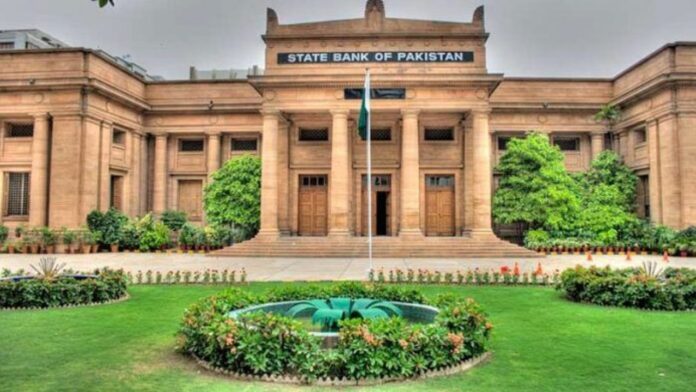The Monetary Policy Committee (MPC) of the State Bank of Pakistan (SBP) has decided to maintain the policy rate at 9.75 per cent.
The decision to keep the policy rate stable based on the inflation outlook which has “improved following the cuts in fuel prices and electricity tariffs announced last week as part of the government’s relief package”.
“Since the last MPC meeting on 24th January 2022, headline inflation moderated in February to 12.2 percent (y/y). Inflation in February would have been noticeably lower were it not for abnormal increases in a few perishable items,” said the Monetary Policy Statement (MPS).
Despite the Current Account Deficit rising in January, the import bill vastly consisted of oil, vaccines and other items financed through loans and supplier credit.
The SBP is of the view that the deficit will not grow as the balance is showing signs of moderation. The statement read, “Excluding these imports, the deficit would have been about $1 billion lower, suggesting that the underlying trend in the current account balance is also moderating.”
Moreover, the SBP claims that the pace of growth has reached a sustainable pace. Previously there were concerns of the boom and bust cycle repeating over unsustainable growth.
“This moderation should help keep at bay demand-side pressures on inflation and contain non-oil imports, notwithstanding the significant uncertainty about the future path of global energy and food prices due to the Russia-Ukraine conflict,” said the MPS.
An end to the tightening cycle?
With global uncertainty following the Russia-Ukraine conflict, the spillovers are impacting the Pakistani economy especially considering the fact that Russia-Ukraine conflict has introduced a high degree of uncertainty in the outlook for international commodity prices and global financial conditions.
However, the SBP will continue to watch developments and decide the upcoming policy rate based on it. “Continued adverse conditions on these fronts could pose challenges to the outlook for the current account deficit and inflation expectations, which could necessitate changes in the policy rate,” said the statement.
As per Tahir Abbas, Head of Research at AHL Limited, “SBP has opt wait and watch policy for time being with the evolving geo political situation and rising commodity prices and indicated that if necessary, MPC will meet again prior to its scheduled meeting on 19 April 22.”
However, Faizan Kamran, CEO of FRIM Ventures explains, “It is prudent of the SBP to highlight that it would call an earlier than scheduled meeting incase of any serious escalation in the geopolitical crisis. A protracted crisis could keep global commodity prices elevated thereby seriously damaging the medium term inflation target as well as the external account and in any such eventuality, the currency parity could face severe pressure and would require monetary policy action.”
Previously, the SBP hiked the policy rate by 150 bps a week earlier than decided in Novermber 2021 based on the macroeconomic developments.
As per a survey conducted by Profit in anticipation of the MPS, most research departments at financial institutions expect the policy rate to remain status quo at 9.75%. This is in contrast to the way the market was responding during the last quarter of the calendar year 2021.
Profit surveyed 17 research departments at financial institutions. 11 expected the policy rate to remain unchanged. Only Adam Securities expected the policy rate to go up by 25 bps, while 5 respondents expected the policy rate to rise by 50 bps. They include Al Habib Capital Markets, BMA Capital, JS Global Capital, KASB Securities, and SCS Trade.
























